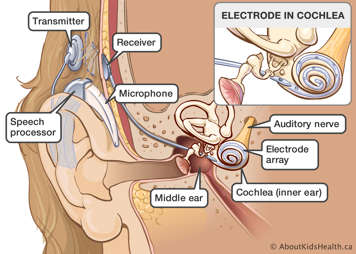What is a cochlear implant?
A cochlear implant (say: KO-klee-er IM-plant) is an electronic hearing device. It has an internal part and an external part.
The external part, called the receiver, is really two parts. The first part is worn like a hearing aid on the outside of the ear. This part of the implant picks up the sound. It sends it to the second part via a coil worn on the head. This coil is attached by a magnet to the internal part. It transmits the sound through FM radio frequencies to the internal part.
The internal part of the implant is placed inside your child's ear by an otolaryngology surgeon. This part has electrodes that transmit (send) sound to the nerve that lets your child hear.
The hairs in your child's ear are like piano keys. As different parts of the inner ear (cochlea) vibrate, different "notes" are played and sent up to the brain. When these hairs are damaged or missing, your child cannot hear well.
An otolaryngologist/head and neck surgeon will do the operation. An otolaryngologist (say: oh-to-lar-ing-GOLL-oh-jist) is a doctor who specializes in problems with the ears, nose and throat.

Before the operation
Many hours before the operation, your child will need to stop eating and drinking. The doctor or nurse will tell you when your child must stop eating and drinking.
Write this information down here:
The date and time of the operation:
When your child must stop eating:
When your child must stop drinking clear fluids:
Other things to remember:
What happens during cochlear implant surgery
Your child will receive a special "sleep medicine" called a general anaesthetic before the surgery. This means your child will sleep through the operation and will not feel any pain.
During the operation, an incision or cut is made behind the ear. The surgeon will put the wire on the inside of your child's ear. A few weeks later, the receiver will be put on the outside of your child's ear.
Your child will have pieces of tape called steri-strips at the incision site. The operation takes two to three hours.
What to expect after the operation
- Your child will spend up to one hour in the recovery room. The room is also called the Post Anesthetic Care Unit (PACU). You can see your child once they wake up from the surgery. A volunteer from the surgical waiting room will bring you to see your child.
- Your child will stay in the hospital overnight. Your child will stay in a room on the otolaryngology inpatient unit. You may sleep overnight in your child's room.
- If your child has pain after the surgery, they will receive pain medicine through a tube put into the vein in their arm called an intravenous (IV) tube. Or they may be given a liquid to swallow.
- Your child will have an IV tube in place until they can drink and no longer needs medicine.
- Your child will be able to drink clear fluids. They can start to eat soft food when they become hungry.
- Your child may feel dizzy and not steady on their feet for the first 24 hours after the surgery. You or another adult should be with your child when they get out of bed.
- Your child will have a gauze bandage on their ear. The bandage may be around their head. Your child's otolaryngology doctor will take the bandage off the day after the operation.
- Your child should be able to go home the morning after the operation if they are feeling well.
Caring for your child at home
- Your child may have swelling on the second day after the operation. If your child has a small gauze bandage over their incision, you may remove this bandage in one to two days. It may take this long for the incision to dry.
- Your child's doctor will give them a prescription for an antibiotic. They should take the antibiotic for one week or as long as your doctor told you to give it. This medicine protects your child from an infection.
- Your child can have a bath. Keep the water level low so their ears do not get wet. Do not get any water in your child's ears. Do not put anything in your child's ears. Do not let the incision behind your child's ear get wet. It takes one to two weeks for the incision to heal completely.
- Leave the steri-strips on until your child's first appointment with the otolaryngology doctor. Do not wash your child's hair until the otolaryngology doctor takes off the steri-strips.
- Do not let your child play sports like hockey or soccer or go swimming until the otolaryngology doctor says it is okay.
- Do not let your child go back to school or day care until after the follow up appointment with the otolaryngology doctor.
Pain management at home
Follow these instructions when your child goes home after the procedure.
You may give your child medicine for pain.
You may receive a prescription for pain medication before you leave the hospital. Follow the dosage instructions given to you by the pharmacist. Although these prescription pain medications can be beneficial, they are also potentially very dangerous if not used properly.
When using these medications, if you notice any changes in either breathing or level of drowsiness that concern you, stop the medication and seek medical attention. If your child is unresponsive, call 911 immediately.
Do not give your child over-the-counter medicine that may have a sedative effect (makes people sleepy) while giving the prescription for pain medicine. Examples of these medicines are decongestants and antihistamines. Discuss these medications with your pharmacist.
You may give your child acetaminophen if they have pain. Give the dose printed on the bottle for your child's age. Do not give your child ibuprofen or ASA for two weeks after the surgery. These medications could increase your child's risk of bleeding after the operation. Check with the nurse or doctor first before giving these medicines to your child.
Your child will have a follow up appointment one week after the cochlear implant surgery.
The otolaryngology clinic will schedule an appointment for your child.
Write the date and time of your child's appointment here:
During this appointment, the doctor will:
- Check your child's ear to see how it is healing.
- Tell you when your child can start routine activity.
- Remove the steri-strips from the incision site.
Important information to remember
- Your child should have the pneumococcal vaccine. This vaccine will lower your child's risk of getting meningitis. Meningitis is an infection around the brain and the spine.
- Contact your child's family doctor or paediatrician if your child has an ear infection. Children with ear tubes will drain pus, blood or mucus when they have an ear infection. If your child's ear is draining, take them to the doctor. The doctor will give your child antibiotic ear drops.
- After your child's implant, they cannot be exposed to electrothermal devices such as electrocautery. Electrothermal devices use heat and pressure to seal a body's tissue during surgery. Your child should also not have a magnetic resonance imaging (MRI) scan.
- Your child should wear a medic alert bracelet. It should say that he has a cochlear implant and that he should not have an MRI or the use of electrosurgical instruments.
- Contact the otolaryngology clinic nurse if you notice anything unusual, such as swelling or redness at the implant site, or if your child is going to have an MRI or any surgical procedure.
- Please do not hesitate to call the otolaryngology clinic nurse or someone from the Cochlear Implant Team if you have any questions.
- Keep up with your follow-up appointments.
The external device will be attached three weeks after cochlear implant surgery
Three weeks after your child's surgery, the audiologist will attach the external device to the outside of your child's ear. This will not hurt your child. It gives your child the chance to get used to wearing the device before it is switched on.
You will be given information about how this device works. You will also learn how to take care of the device.
The external device will be switched on the following week by your child's audiologist
Your child will have regular appointments after the first time the device is programmed.
When to call the doctor
Call your child's otolaryngologist, the otolaryngology clinic nurse or family doctor right away if your child has any of these signs after going home:
- fever of 38.5°C (101°F) or higher
- blood or fluid leaking from the incision site
- an incision site that looks reddened or swollen
- vomiting (throwing up) that does not stop
- pain that gets worse
If this is an emergency, or if you are worried, do not wait. Take your child to the closest emergency department.
Important phone numbers
My child's otolaryngologist is:
The doctor's phone number is:
The otolaryngology clinic nurse's number is:
The Cochlear Implant Program contact number is:
